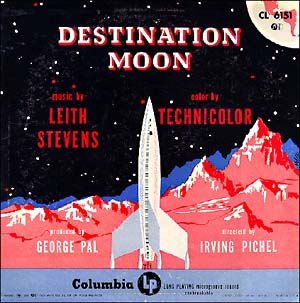Leith Stevens’ Destination Moon + Chapter 2: The Making of BSV 1172
Sometimes one’s sense of invulnerability is completely delusional, because after hearing how ‘other people’ were hit with tummy flu bugs, I got hit not once but twice with the bug. Low-level variety, but still punchy enough to yield pounding headaches and zero appetite for about two weeks. Amazing how the pants still fit. Must be all the carbs I devoured beforehand that have made the weight loss more subtle than glaring.
In any event, first up is a review of Monstrous Movie Music’s Destination Moon [M] CD, featuring Leith Stevens’ complete score to George Pal’s visionary and highly influential sci-fi film about space exploration. Musically, the score is perfect, and it’s a wholly accessible yet evocative work that avoids many genre clichés because it endures as one of the most engaging ‘space scores’ ever written.
Stevens has been a personal favourite of mine for decades, so it’s a treat MMM’s disc finally brings out what was for the composer’s fans, as well as fans of Pal’s sizeable sci-fi film catalogue, a Holy Grail. Taken from acetates, the sound quality’s perfectly fine, and shouldn’t deter younger sci-fi fans from snapping up this non-limited CD. (Most CDs tend to be limited now, so it’s nice to see MMM’s decided to keep this one as part of its active catalogue.)
Those unfamiliar with acetates might be hesitant, if not adverse to listening to music sourced from what are archival LPs with audible surface wear. There’s a limit as to how much you can clean up an LP – something with which jazz fans are well familiar – before the performances start to sound pinched, dry, or muddy. Years ago, it was the habit by over-zealous producers to overuse a new technology or software’s ability to ‘clean up’ and ‘deepen’ the sonic realm of mono recordings, if not simulate stereo, and those efforts don’t sound so good today, given the best engineers and restorationists quickly realized there’s a fine line between preservation, and mucking up what you’re stuck with.
Jazz fans will also be among the first to say that mono isn’t bad; there are many fine mono recordings that feature a wide sonic range, with good highs, mids, and deep bass; most of the vintage Savoy LPs remastered a good 10-15 years ago on CD are among my favourite jazz recordings.
In any event, what’s disappointing is when a score no longer survives in complete form rather than in a mono recording, and for 1950, Destination Moon sounds pretty fine. Ultimately, it’s the music and the composer’s skill that grab your attention, not pops & ticks.
I’m sure fans are equally less picky of La-La Land’s 15-CD monster set featuring the mono music from the original Star Trek TV series. Portions have appeared on LP and CD in the past, but this marks the first time whatever survives has been archived on disc for commercial release. The plus: it’s limited to 6000 copies. The shock: it’s $225, which does work out to $15 / CD, but is a major purchase not everyone can make. After (over)indulging in vintage camera gear this fall, it’ll be a while before I can get my hands on the set for a review. Hopefully there’ll still be a thousand copies around from LLL for another 6 months.
Speaking of vintage camera gear, I’ve uploaded the second chapter of the production diaries for BSV 1172, the short doc I filmed in Oct. + Nov. and is currently in post-production.
Chapter 2 deals with burn spots and other aberrations that can happen during filming, or are already present when buying vintage gear. The blog is also accompanied by a short video showcasing a grievous boo-boo that occurred during filming, plus specific artifacts: dead pixels, black dots, and green splotches. Part of the video & blog’s function is to collate comments which will hopefully offer some explanations of said aberrations, if not possible solutions. You can read & see more at Big Head Amusements.
Quick note: alongside the Moon CD review, I’ve added mobile versions of related film reviews, including Destination Moon [M] (1950), The Phantom Planet [M] (1961), and World Without End [M] (1956).
Coming next: reviews of the British horror series Chiller (Synapse Films) and the short-lived Ultraviolet (Palm).
.
.
Mark R. Hasan, Editor
KQEK.com ( Main Site / Mobile Site )
* * *
Category: EDITOR'S BLOG, FILM MUSIC, FILM REVIEWS






Connect
Connect with us on the following social media platforms.